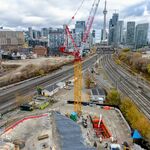Northern Light
Superstar
1.4% population growth, is a very large number, largest in the G7.
Also of note, is that while just over 82% of said growth came from immigration, that means roughly 18% did not.
This suggests that current replacement rate birth is enough to actually grow the population on its own.
To be clear, those observations are not in any way opposing immigration; but I do feel that governments/parties need to be honest in having the conversation about the 'why' and what we are actually trying to achieve.
My observation would be that the demographic reasons asserted for immigration are substantially less than advertised at this point.
The more probable reasons would be to lower the cost of labour; and to increase the size of the Canadian economy on an aggregate basis.
Those aren't necessarily bad reasons; but where one fails to discuss objectives in a frank manner, I think there is a greater risk of backlash.
I also think its important to properly measure things so we have constructive answers on what we are achieving or not.
Real (inflation adjusted) GDP per capita is the economic statistic of interest here to start.
But I would also be interested to look at the listed occupations of immigrants and refugees, and then look at the average wage trends in those professions.
Once again, I'd say, even if the impact in a given profession is linked to lower wage growth, that isn't automatically a bad thing. But its one thing to suppress the growth in wages of a six-figure IT specialist or a $500,000 medical specialist; its another to suppress wages of farm workers, office cleaners and security guards.
****
One further note of interest. If you take that level of growth and compound it over 30 years; Canada will have a population of just over 59 million in 2049 and 92.6 Million in 2079




